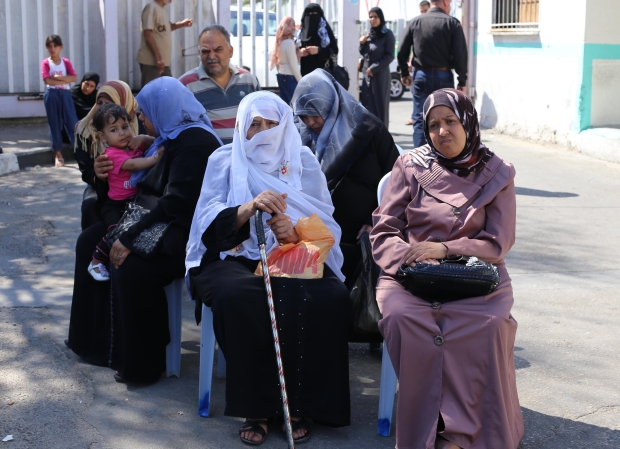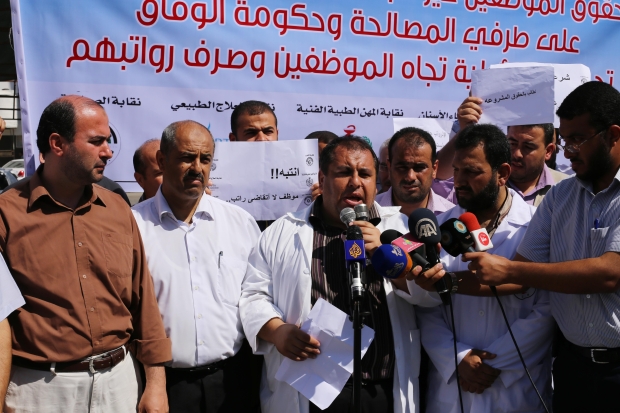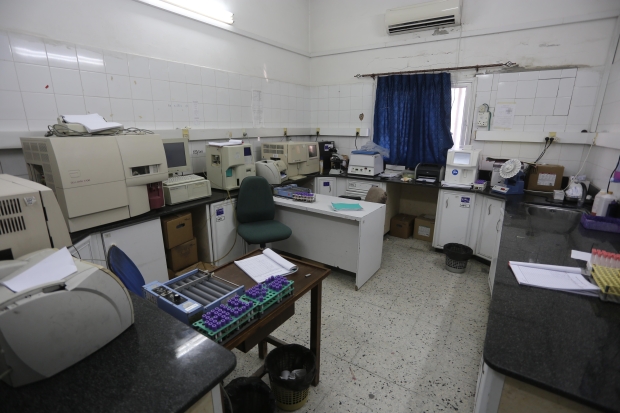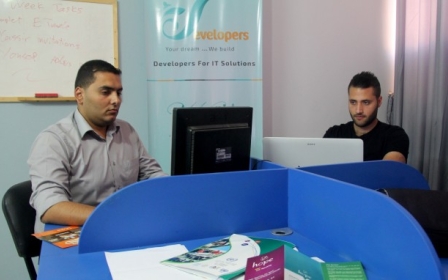Gazans struggle as wage freeze threatens unity deal

GAZA CITY - In Gaza’s historic old quarter, the market souk al-Zawya is eerily quiet, sellers sit behind stalls sheltered by bright coloured umbrellas. Many look visibly overheated and depressed and there is a palatable air of economic despair that can be felt in the week leading up to Ramadan.
The economy is rough for everyone here. While in 2007 there were 35,000 workers in the textiles industry, there are now just 3,000. Only 20 of 300 approved public construction projects are underway, and the unemployment rate which already stands around 40 percent, refuses to stop edging ever upward.
Currently, however, it’s the plight of 50,000 Hamas government workers that is igniting chatter in strip’s markets and alleyways.
Many of these government workers have not been paid for more than seven months, while others have received only partial pay. All were promised that their salaries would be unfrozen as soon as the new Palestinian unity government met in early June, but this has failed to happen with Hamas officials estimating that the workers could be owed as much as $1bn in back payments.
As many as 600,000 Gazans who are members in government workers' families - or an estimated 36 percent of the Gazan population - have been impacted by the pay freeze, according to a Hamas government spokesperson.
To make matters worse, Hamas workers say that they have been discriminated against for years being paid about $200 a month less than their Palestinian Authority counterparts in Gaza.
Resentment over the pay gap has often spilled into protest. On Thursday, tensions erupted once again when workers in virtually all of Gaza’s public sector industries walked out in a day-long strike over pay grievances.
[[{"fid":"3179","view_mode":"content_full_width","fields":{"format":"content_full_width","field_file_image_alt_text[und][0][value]":"Female protesters in Gaza on Thursday (MEE / Mohammed Assad) ","field_file_image_title_text[und][0][value]":"Female protesters hold banners saying \"Employee rights are a read line\" (MEE / Mohammed Assad) ","field_file_caption[und][0][value]":"Female protesters hold banners saying \"Employee rights are a read line\" (MEE / Mohammed Assad) "},"type":"media","attributes":{"alt":"Female protesters in Gaza on Thursday (MEE / Mohammed Assad) ","title":"Female protesters hold banners saying \\\"Employee rights are a read line" (MEE / Mohammed Assad) ","height":413,"width":620,"class":"media-element file-content-full-width"}}]]
Eerily quiet
The economic fallout from the Hamas worker wage freeze has already started to have a noticeable impact on the whole economy.
On the outskirts of al-Zawya market, one man empties his pockets showing only 140 shekels, or about $40. He says that’s all he’s been able to make in a week, when he used to make 2,000 shekels or almost $600 a week selling his produce.
Further inside the market, two small businesses owners who run a shop selling household items also say they’re suffering. Fareq Nassar and Salman Aloha both in their sixties, complain that life is becoming increasingly hard.
“The unity government was only formed for the media - we have not seen anything on the ground. We still live with the siege - nothing has changed in our simple lives,” Nassar said.
His business partner Alhou agrees and says that friends and families are struggling to keep spirits high in these difficult time.
“To lift each other’s spirits - we talk about problems: how is your life, the things that are difficult, the political life,” says Alhou. “We hope God it will get better tomorrow, next Friday, next month, next year,” he trails off and excuses himself as the muezzins across the city start their call to prayer.
Close family ties have long shielded Gaza from some of the worst effects of widespread unemployment, but even these support systems are seriously struggling to cope.
In Gaza’s city centre, 23-year-old Mohammed Abukwaik sells women’s jewellery in a shop owned by his cousin. He says he is expecting his first child in just under three months and is worried this year that no one is buying anything ahead of Ramadan, which usually sees an upswing in sales.
“We hope that sales before Ramadan will be normal, because sales are usually higher before Ramadan - we hope it will be the same this year - we hope,” he said, while attributing the slowdown to the 50,000 Hamas government workers that have not been hit by the salary freeze.
With extended families relying on the few family member who can get work to stay afloat, the pay freeze has permeated through all levels of Gaza’s society, with cleaners, administrators, teachers and government ministry staff hit by payment problems.
Roots of the crisis
After Hamas seized control of Gaza in 2007, it formed its Gaza-based administration and had to fill thousands of government jobs left empty when the Palestinian Authority told its staffers to stay at home. The PA kept on paying their employees, but the 50,000 people recruited by Hamas in Gaza to fill the void were never fully paid. In recent months, the general economic crisis in the Palestinian Territories took an even higher toll as their salaries were stopped or slashed.
Hopes were high that the interim unity government formed between Hamas that rules Gaza and Fatah that governs the West Bank would end the pay crisis. A few days after the ministers were sworn in, pay was deposited into the accounts of Gaza-based Palestinian Authority staff, but employees that had been hired by Hamas remained unpaid.
One ex-Hamas government worker told MEE that he had been unpaid for nearly seven months and didn’t see any end in sight. To make matters worse, as soon as the interim unity Government was sworn in on 2 June, banks shut their doors for 10 days, spreading the financial panic even further afield.
New Minister of Labour Mamoun Abushahla was one of the three ministers in Gaza who was recently sworn into the new unity cabinet remotely because he was unable to attend the official event in Ramallah due to Israeli restrictions. While he insists that funnelling payment to the unpaid Hamas government staff is a top priority for the interim government, he admits that the new authority finds itself facing a host of difficult choices.
“The salaries have to be paid - it’s an obligation on this government that the salaries need to be paid, but finding the money is difficult. And this is not going to happen before Ramadan, it will take some time,” says Abushahla.
The Qatari Government have offered to contribute $60 mn, paid in three $20 mn instalments, to help alleviate the pay crisis. However, Abushahla insists that Israel has now blocked Qatari funds from being transferred to the Palestinian Authority.
He believes the pay deal is the toughest issue alongside the continued closure of Rafah Cross into Egypt and could mean the reconciliation attempt falls flat if unity elections are not held within six months as envisioned.
According to Abushahla, the first payment from Qatar was due to be made on 27 June but this had been stopped, meaning that the 50,000 workers and their families will be left struggling through the month of Ramadan.
“Israel is launching some false and silly accusations on Hamas and the Government in this country in the past has easily received money that Israel has allowed to come in,” says Abushahla.
“Last year, Qatar pledged to pay $500 mn and Israel allowed the deposit and the raw materials to come in.
“Why are they not allowing it now? It’s clear that Israel has become so nervous about this unity government and they don’t want to allow the Palestinians to unite again and they want us to suffer from continuous division,” he added.
Israel considers Hamas to be a terrorist organisation and opposes the unity deal. It has since clamped down hard on the West Bank and Gaza in an attempt to expose fissures between the two Palestinian camps.
Abushahla accuses the Israeli Government of using old and tired tactics to shatter the recent unity.
“They are pressuring Abbas to break the agreement, but this is something that will never happen and we will not surrender to the Israeli financial, economic and military pressure and we will not surrender to the Israeli terms and conditions,” says Abushahla
Reopening Rafah?
With Israel tightening the screws even more since the unity deal, most Palestinians in Gaza with whom the MEE spoke said they had seen little or no change to the economic stranglehold on the strip more than three months after deal first came to light.
However, a reopening of the Rafah Crossing into Egypt, which should in principle be made possible by the unity deal, could very swiftly turn this around.
According to the Palestinian Contractors Union, an estimated 100,000 public works jobs would be created soon after the crossing is opened, with thousands more jobs construction jobs expected to come from the private sector quickly thereafter. This could bring countless millions back to Gaza and get the economy moving again.
Under the reconciliation agreement, the Fatah-controlled presidential guard should return to Gaza and the Rafah Crossing before the crossing can be reopened. Abushahla insists that while this would happen gradually, we could see the first troops arrive as early as next week.
“The first 3,000 will come before the end of this month,” says Abushahla.
This is outlined in the Cairo agreement, signed in 2012 between Fatah and Hamas which outlined how Rafah Crossing should be controlled in the presence of EU monitors and with the security of the presidential guard, controlled by Palestinian President Mahmoud Abbas.
“Hopefully the new unity Government will take over. Then after that it will become possible to negotiate with the Egyptians to open the Rafah crossing - not only for the people but for good and products,” says Abushahla.
But when, and indeed whether at all, this gradual easing of restrictions will take place remains a mystery.
“The Egyptians and Abu Mazen [Abbas] have to decide what to do about Rafah,” says Bassem Naim, former adviser to Hamas and Hamas ex-Prime Minister Ismail Haniyeh.
“Hamas will have input, but I think ultimately now it’s the responsibility of Abu Mazen and the unity Government that needs to take over all ministries, borders and all other things.”
Naim says he thinks Haniyeh - who was once a domineering figure in Gaza’s political landscape, but stepped down from his post because of the unity deal - is keeping a low profile but had been busy as deputy head of Hamas.
“He is trying to prevent the collapse of the reconciliation process, but he’s trying to live normally while taking some caution,” adds Naim while stressing that he remains dissatisfied with Palestinian president Mahmoud Abbas’s efforts.
“Abu Mazen should leave - I think he is a catastrophe for the Palestinian people,” says Naim.
“He hasn’t taken any steps or actions promised in the reconciliation.”
Stay informed with MEE's newsletters
Sign up to get the latest alerts, insights and analysis, starting with Turkey Unpacked
Middle East Eye delivers independent and unrivalled coverage and analysis of the Middle East, North Africa and beyond. To learn more about republishing this content and the associated fees, please fill out this form. More about MEE can be found here.







